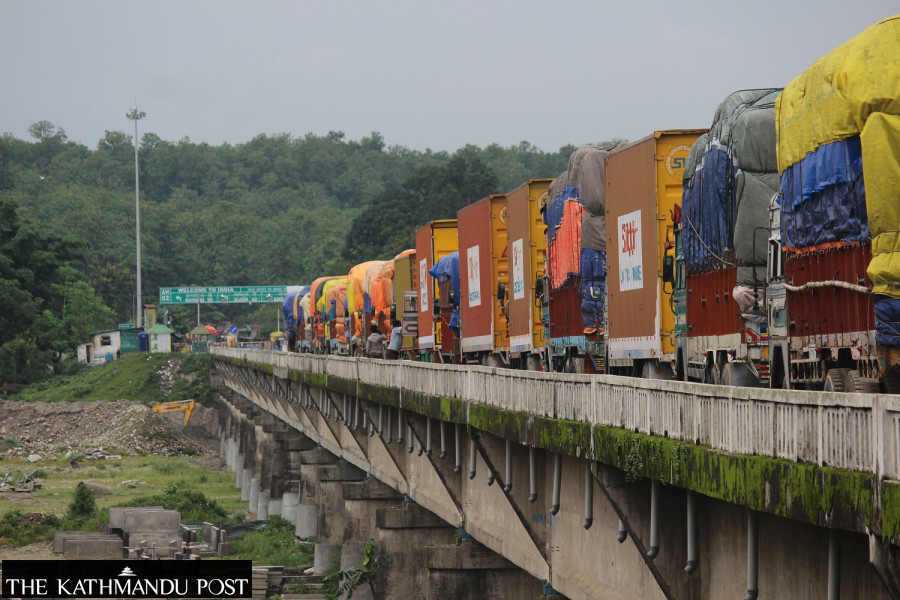National
Government struggling to hit revenue targets after prolonged import curbs
Its contrasting policy of reducing imports but boosting revenues, as expected, appears to be headed for a failure. Election-targeted populist measures have not helped either.
Prithvi Man Shrestha
The government policy of reducing imports and ramping up its revenue appears to have failed with major revenue offices reporting substantial shortfall in revenue collection compared to the target.
The Department of Customs reported a collection of only 73 percent of targeted revenue as of September 29 as imports of major revenue generating items such as vehicles continue to be restricted. There has been a collection of Rs83.78 billion against the target of Rs114.26 billion as of September 29, according to the customs department.
Likewise, the Inland Revenue Department (IRD) collected only 90 percent of the target during the first two months of the current fiscal year 2022-23, according to figures provided by the taxation body.
The tax authority collected Rs67.91 billion against the target of Rs75.60 billion during the first two months of this fiscal which began in mid-July, the IRD said.
Collection of two major sources of revenue—income tax and value added tax—stood at 78 percent and 86 percent of their respective targets for the first two months, according to the tax authority.
These early signs suggest that the government would struggle to meet revenue targets in the current fiscal year as the government’s policy of restricting imports has continued amid declining foreign exchange reserves.
The federal government, through the budget, has adopted the policy of reducing imports by 20 percent in the next fiscal year in stark contrast to its aim of boosting revenues by nearly 22 percent from the projected total revenue collection in the last fiscal year 2021-22.
With the government’s revenue long reliant on imports, its policy of reducing imports and boosting revenue appears to have failed with limited alternatives of revenue-collection from domestic economic activities.
Through the Financial Act 2022, the government has increased excise duty on certain goods including liquor products and introduced new taxes such as vehicle services tax.
“Normally, the revenue collection rises sharply during the festival season because of heavy imports targeting the festivals,” said Punya Bikram Khadka, information officer at the customs department. “The situation is different this year with a collection of just 73 percent of target.”
On September 27 and 28, the customs department had organised a customs management workshop with the participation of customs officials. “We concluded that meeting the revenue target this fiscal year is very challenging,” Khadka said.
According to him, one of the major factors behind poor revenue collections by the customs office is the ongoing import restrictions on the major revenue generating goods.
In late April, the government imposed a complete ban on the import of all kinds of readymade liquor, readymade cigarettes and tobacco products, snacks like Lay’s potato chips and Kurkure, diamond, expensive mobile and television sets, automobiles, toys and playing cards till mid-July.
In August, the government announced an extension of the ban on the import of automobile, mobile phones, liquor and motorcycles until October 14.
However, the government has decided to lift the ban on six goods including diamonds, television sets larger than 32 inches, toys, cards, snacks and tobacco and tobacco-related products.
“Some vehicle dealers have not come to get customs clearances for around 1,000 four wheelers which had arrived at the Birgunj and Bhairahawa customs points before the ban was imposed in April,” said Khadka. “That’s why we have not been able to collect revenue from their imports. Moreover, around 1,100 chassis of the four wheelers have also been parked at the customs yard in Birgunj.”
He said that the department had asked the concerned customs offices to follow up with the importers of these vehicles and chassis for early customs clearance.
The customs department said it has been given a target of increasing its revenue by 26 percent to Rs668.76 billion for the next fiscal year.
Even in inland revenue, meeting the revenue target is going to be challenging. “We have to grow our revenue by 30 percent to meet the revenue target for the current fiscal year which is very challenging,” said Raju Prasad Pyakuryal, information officer at the IRD. He said that the tax offices were struggling to meet the target as they are yet to receive a large sum of VAT amount from the service and construction sector. “Due to limited construction works and payment for the works, VAT collection from construction is limited,” he said.
A target of Rs537 billion was given to the Inland Revenue Department for the current fiscal year.
Despite the high likelihood of a significant deficit in revenue collection, the government has also increased its liability substantially through the budget for the current fiscal year.
The government introduced a budget of Rs1.79 trillion for the current fiscal year mostly targeted at elections, with populist schemes galore.




 9.12°C Kathmandu
9.12°C Kathmandu















